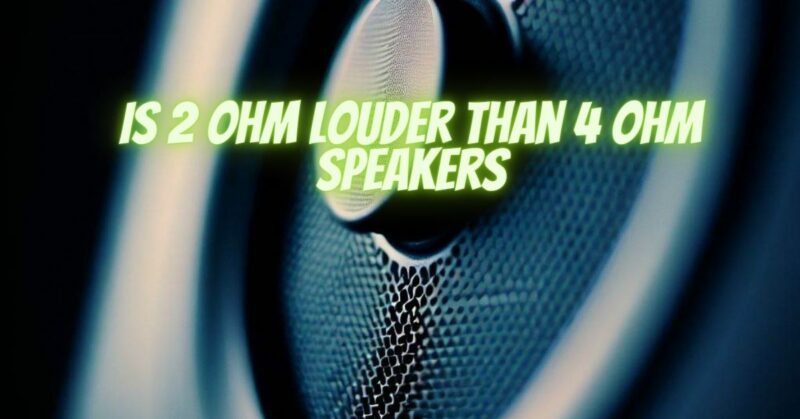The quest for optimal sound quality and volume in audio systems often leads to questions about speaker impedance. Among these queries, the debate about whether 2-ohm speakers are louder than 4-ohm speakers stands out. This article aims to address this common misconception by exploring the relationship between impedance and volume, helping you grasp the nuanced factors that truly impact the loudness of speakers.
Understanding Speaker Impedance
Speaker impedance, measured in ohms, quantifies the electrical resistance a speaker presents to the amplifier’s current. It’s a fundamental parameter that influences how power is distributed and how sound is produced.
The Volume Myth
The belief that 2-ohm speakers are inherently louder than 4-ohm speakers oversimplifies the complex dynamics at play. While impedance does play a role in the sound output, other elements contribute significantly to overall loudness.
Sensitivity and Efficiency
Sensitivity, measured in decibels (dB), reflects a speaker’s efficiency in converting electrical power into sound. A higher sensitivity rating indicates that a speaker can produce more sound with the same input power. Sensitivity varies across speakers, regardless of their impedance.
Power Handling and Amplification
Loudness also depends on a speaker’s power handling capacity and the amplifier’s output power. While 2-ohm speakers might draw more current from the amplifier, this doesn’t necessarily equate to louder sound without the right amplification.
Speaker Design and Quality
A speaker’s design, quality of components, and construction play a significant role in sound reproduction. Higher-quality drivers, enclosures, and materials can result in clearer sound and better volume performance, regardless of impedance.
Amplifier Matching and Compatibility
Pairing speakers with amplifiers is crucial for optimal performance. If a 2-ohm speaker is not matched with an amplifier capable of delivering the required current, the result might be reduced sound quality and performance.
Selecting the Right Impedance
When selecting between 2-ohm and 4-ohm speakers, consider the following:
- Amplifier Capabilities: Choose speakers that match your amplifier’s capabilities. The amplifier should be able to provide the necessary power for the desired volume level.
- Sensitivity Rating: Look for speakers with higher sensitivity ratings, as they are more efficient at converting power into sound.
- Room Acoustics: Assess the acoustic characteristics of the room where the speakers will be used, as this can impact perceived loudness.
The notion that 2-ohm speakers are inherently louder than 4-ohm speakers is a misconception that overlooks the intricate interplay of factors affecting loudness. Sensitivity, power handling, amplifier quality, and speaker design all significantly influence how loudly a speaker can produce sound. When choosing speakers, focus on overall quality, compatibility with your audio setup, and your desired listening experience to ensure the best volume performance.


